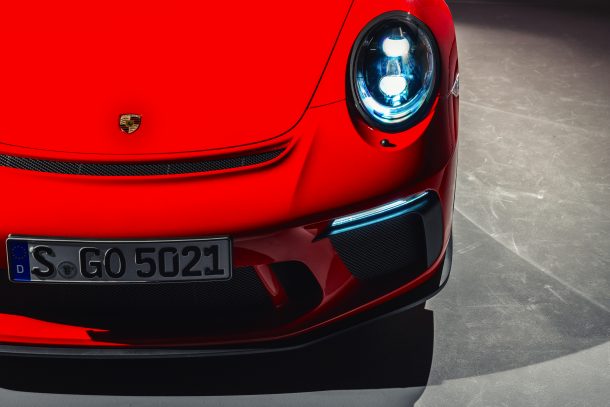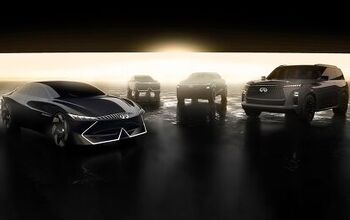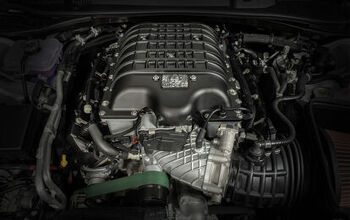Flip This Porsche: Automaker Hopes to Stop Future Speculators

The secondhand market for sporting automobiles is a bubbling cauldron of volatility with one assurance — rarer is always better. Being racy doesn’t hurt resale value, either. That’s why track-focused manual transmission Ferraris go for an exorbitant premium on the secondhand market against their more casual counterparts. It’s also why certain the versions of the 911 can be resold at over double their original MSRP. But Porsche, like many high-end performance manufacturers, is getting sick of customers purchasing their vehicles for the sole purpose of flipping them.
The German automaker says it’s extremely aware of what is going on in the secondhand market and actively wants to take steps to crack down on for-profit flipping. It has also, perhaps inadvertently, made some headway already by bringing the 2018 911 GT3 to market with a manual transmission — potentially devaluing the manual-only 911 R. This has annoyed some capitalists hoping to resell the R at triple its original value. To that Andreas Preuninger, head of Porsche’s GT division, says “we’re not a hedge fund.”
Preuninger told Car and Driver he believes his company builds cars to be driven, not held onto for financial gain. “I personally like to see my cars being used. That’s what we build them for. They are just too good to be left to stand and collect dust,” he said at the launch of the new 911 GT3.
“I don’t like this business of people buying our cars to make money on them. That was never our intention. The purpose of limiting a car is not for it to gain value. We don’t want to be laying money on each car’s roof when they run out of the factory.”
The mere fact that the manual 911 R was going for so much was evidence enough of the clear demand for a GT3 without flappy paddles, according to Preuninger. Screwing potential flippers is just an added bonus.
“When I said we’re not a hedge fund, I’m talking to those people who are yelling at us for offering the manual transmission similar to the R,” he said. “But if there are people wanting to buy cars like that, then as a company we should try to fulfill that, to meet that demand.”
However, offering another model with a stick doesn’t eliminate the buy-to-sell practices Porsche is so bothered by. For that, the brand is taking a more direct approach.
“We are monitoring very closely who is flipping cars,” Preuninger explained. “We do not build too many cars and we know most of our customers well — we like to have a name for every car before we build it. If you’re flipping cars, then I think it’s understandable that you won’t get on the list for the next car if we have more demand than supply.”
Porsche has to walk a fine line here. While garage-queen flippers don’t line up with the brand’s image, the carmaker needs to retain the intrinsic “specialness” of the GT models, which creates the incentive to store them for profit in the first place.
[Image: Porsche]

A staunch consumer advocate tracking industry trends and regulation. Before joining TTAC, Matt spent a decade working for marketing and research firms based in NYC. Clients included several of the world’s largest automakers, global tire brands, and aftermarket part suppliers. Dissatisfied with the corporate world and resentful of having to wear suits everyday, he pivoted to writing about cars. Since then, that man has become an ardent supporter of the right-to-repair movement, been interviewed on the auto industry by national radio broadcasts, driven more rental cars than anyone ever should, participated in amateur rallying events, and received the requisite minimum training as sanctioned by the SCCA. Handy with a wrench, Matt grew up surrounded by Detroit auto workers and managed to get a pizza delivery job before he was legally eligible. He later found himself driving box trucks through Manhattan, guaranteeing future sympathy for actual truckers. He continues to conduct research pertaining to the automotive sector as an independent contractor and has since moved back to his native Michigan, closer to where the cars are born. A contrarian, Matt claims to prefer understeer — stating that front and all-wheel drive vehicles cater best to his driving style.
More by Matt Posky
Latest Car Reviews
Read moreLatest Product Reviews
Read moreRecent Comments
- Marcr My wife and I mostly work from home (or use public transit), the kid is grown, and we no longer do road trips of more than 150 miles or so. Our one car mostly gets used for local errands and the occasional airport pickup. The first non-Tesla, non-Mini, non-Fiat, non-Kia/Hyundai, non-GM (I do have my biases) small fun-to-drive hatchback EV with 200+ mile range, instrument display behind the wheel where it belongs and actual knobs for oft-used functions for under $35K will get our money. What we really want is a proper 21st century equivalent of the original Honda Civic. The Volvo EX30 is close and may end up being the compromise choice.
- Mebgardner I test drove a 2023 2.5 Rav4 last year. I passed on it because it was a very noisy interior, and handled poorly on uneven pavement (filled potholes), which Tucson has many. Very little acoustic padding mean you talk loudly above 55 mph. The forums were also talking about how the roof leaks from not properly sealed roof rack holes, and door windows leaking into the lower door interior. I did not stick around to find out if all that was true. No talk about engine troubles though, this is new info to me.
- Dave Holzman '08 Civic (stick) that I bought used 1/31/12 with 35k on the clock. Now at 159k.It runs as nicely as it did when I bought it. I love the feel of the car. The most expensive replacement was the AC compressor, I think, but something to do with the AC that went at 80k and cost $1300 to replace. It's had more stuff replaced than I expected, but not enough to make me want to ditch a car that I truly enjoy driving.
- ToolGuy Let's review: I am a poor unsuccessful loser. Any car company which introduced an EV which I could afford would earn my contempt. Of course I would buy it, but I wouldn't respect them. 😉
- ToolGuy Correct answer is the one that isn't a Honda.


































Comments
Join the conversation
Flippers ruin it for people who actually WANT the car... to have it and to drive it. And it's not just Porsche... or even just cars. I can't tell you how many cars I've lost out on over the past 5-10 years because it was bought by a flipper before I could get there... only to resurface a few days/weeks later for sale at a higher price. They don't even transfer the title/registration into their name. No, it's not illegal... and I get that they're just trying to make a buck. I just don't like it. Those with time & money on their hands can swoop in & scoop the cars worth having. Craigslist really displays this trend. I've seen resellers list the new, higher-priced ads even before the old ad is deleted. Re-selling appears to be quite lucrative.
To be frank, if they weren't smart enough to see this problem developing a decade ago, they aren't smart enough to fix it. Only a band of detached ideological engineers could convince themselves that they can command the market by restricting the supply of what people want. Enthusiasts are the people most willing to dedicate money to a vehicle, and they have very specific demands about the relationship between the driver and the car. If you do not meet those demands, bad things will happen. This is exactly how engineers ruined motorsport.